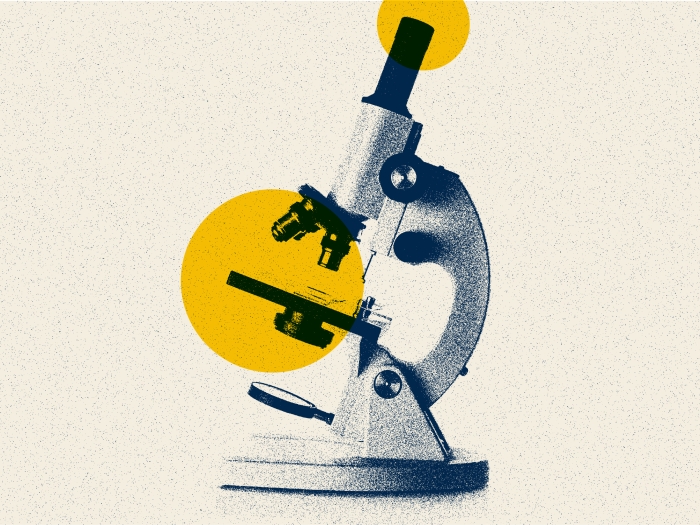Early career researchers describe their professional journeys to help inspire women and girls pursue careers in science
4:00 PM
Author |

Since 2015, the United Nations has recognized the importance of promoting increased representation of women and girls in the scientific fields.
A “significant gender gap has persisted throughout the years at all levels of science, technology, engineering and mathematics (STEM) disciplines all over the world,” they noted. “Even though women have made tremendous progress towards increasing their participation in higher education, they are still under-represented in these fields.”
In celebration of the many achievements of women within the biomedical sciences, Health Lab reached out to several researchers in the biomedical sciences at University of Michigan Medical School to ask what got them interested in their disciplines and what advice they have for girls who may want to follow in their footsteps.
Sai Pranathi Meda Venkata, Ph.D. – postdoctoral fellow, Pharmacology
I pursued my career in science because of my love for science as long as I remember. My grandfather was a type 2 diabetic and had cardiovascular issues while I was growing up. I was always curious to try and understand the biology behind it and help him in any way possible. That instilled in me a deep sense that there was so much more to know, learn, understand and I wanted to go out and discover what it was. I was a biology major in my high school and throughout my career. That landed me in a pharmacology major in my Ph.D. training and I am continuing my research in the same field and loving it!
Do not limit your options and be ready to build your own path and never give up!
Krista Armbruster, Ph.D. – postdoctoral research fellow, Microbiology & Immunology
Like many young students with an interest in science, I started down the pre-med route to become a physician, however I quickly learned that was not the right path for me. Instead, I looked for research opportunities and landed in a protein crystallography lab. My project took an unexpected turn into microbiology, and I just loved it. I followed that unexpected love of microbiology into my graduate studies and now my postdoc, where I get to discover new things that no one else in the world knows except me (at least for a moment). The number of questions are endless and I love finding pieces to the puzzle.
A piece of advice I would give to young women pursuing careers in science is to challenge yourself and try new things, you might be surprised at what you find!
Flora Rajaei, Ph.D. - postdoctoral fellow, Computational Medicine and Bioinformatics
The human body is an amazingly complex system that has allowed mankind to accomplish incredible feats but is also vulnerable to breaking down. Pursuing science has provided me the opportunity to help unlock the mysteries of this system with the goal of identifying the failures that can lead to illness as well as harnessing the resiliencies to develop new therapeutics.
Computational medicine is a multidisciplinary field that has fascinated me by transforming the big data generated in biomedical research and healthcare into computational models that are personalized to each patient. It has been extremely rewarding to see how the application of these models can improve the diagnosis and treatment of various diseases.
Believe in your passion for science and your capabilities and be enthusiastic and persistent in pursuing your dreams.
Josepha Sedzro, Ph.D. – research fellow, Biological Chemistry
I have always been interested in biology ever since my mother was diagnosed with sickle cell anemia. I aspired to pursue studies in a field directly related to health, with a focus on blood related disease. What I like about biological chemistry is that understanding the functions and structures of proteins can potentially lead to the development of new/better therapeutic drugs.
I would encourage young women pursuing careers in science to speak and give their opinion without hesitation, even if they are not sure about it and ask questions, even if the question seems basic.
Amanda Missel, Ph.D. – research fellow, Learning Health Sciences
Science was always my favorite subject in school, and I wanted to be an integral part of improving health. I chose learning health sciences because I wanted to use more efficient methods of identifying and implementing care to improve health.
To value your unique perspective as it may offer new solutions to problems.
Megan Radyk, Ph.D.- postdoctoral fellow, Molecular & Integrative Physiology
There wasn’t one specific “Aha!” moment that inspired me to pursue a career in science, but it was always one of my favorite subjects. In my sophomore year of high school, I was lucky to participate in a two week summer program at a local college where I learned about forensic anthropology and witnessed a real autopsy. This experience sparked my interest to study biology in college. During undergrad, I joined a Drosophila research lab and really enjoyed performing experiments and working with a team to answer unknown scientific questions.
My research mentor, Dr. Thomas, encouraged me to apply for graduate schools and begin a career in scientific research. I am happy to be a part of the Department of Molecular & Integrative Physiology with many collaborative colleagues. For me, physiology research is great because it encompasses so many different scientific specialties and I’m always learning something new.
I would advise young women pursuing careers in science to develop a strong and supportive mentorship team. This includes formal mentors who will write your letters of recommendation and serve on a thesis committee (for example) and informal mentors who you might not meet with on a regular basis. Include people at different career stages, people you can go to for help when things are challenging, and people you can celebrate accomplishments with. It’s impossible for one mentor to give you all the support and guidance you need throughout your career, so build a team you can always rely on.
Ramiah Jacks, Ph.D. – postdoctoral fellow, Molecular & Integrative Physiology
What inspired me to pursue a career in science is my intense desire to find our answers to my burning questions. Growing up I learned that some of my family members were affected by autoimmune diseases. Upon learning this, I asked many questions about how our body works, and how can our immune system protect us against germs that harm us and also can attack our own cells. I became frustrated when my many questions were met with “well, we don’t know yet.”
From then I knew I wanted to spend the rest of my life figuring out how to answer my questions and use these answers to find ways to improve our health. To achieve this, I studied immunology in graduate school. In my current position as a postdoctoral research fellow, I use my immunology knowledge to study adipose tissue T cells to understand how they contribute to the changes in adipose tissue that are associated with obesity and insulin resistance.
One piece of advice I would give to young women pursuing careers in science is to not lose the joy of discovery! While pursuing a career in science, it can become easy to get lost in literature reading, experiment preforming, data analysis, presentation giving, and grant writing that we forget our “why”. Take a step back and periodically remind yourself of your “why”. My “why” is the love and joy I have for scientific discovery and providing answers to my many questions.
Lindsay Moritz, Ph.D. – postdoctoral fellow, Human Genetics
I've always had an insatiable passion for understanding the "why" of how our bodies work, but I really fell in love with science when I started doing research as an undergrad. I was, and still am, so fascinated and driven by the multitude of tools we have to study biological processes in the lab and to be able to provide some answers about the "why."
I was exposed to human genetics (in particular, the genetics of development) early on in graduate school and loved it ever since. The elegant orchestration of so many complex processes that come together to form a functioning organism, to me, is such a captivating research question with still so many unknowns of "why" that I'm inspired to continue to investigate.
One piece of advice I would give to young women pursuing careers in science is to passionately pursue your scientific question, but always keep an open mind. Learning to fall in love with the process and not just the outcome will allow you to see alternatives you may have otherwise missed, and also overcome obstacles.
Often, "failed" experiments can teach you just as much as successful ones. Never underestimate yourself, and surround yourself with people that will support you, lift you up and push you to be a little better every day.

Explore a variety of health care news & stories by visiting the Health Lab home page for more articles.

Department of Communication at Michigan Medicine
Want top health & research news weekly? Sign up for Health Lab’s newsletters today!





